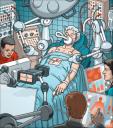Providing Support for Tragic Decision Making
Wednesday, October 14th, 2009 I was recently asked to provide input on a new procedure and communication materials a hospital had designed to support family members when they were faced with a decision to discontinue life support for a loved one. Clearly a serious issue and one that warrants a full-on cognitive design. I was glad they asked.
I was recently asked to provide input on a new procedure and communication materials a hospital had designed to support family members when they were faced with a decision to discontinue life support for a loved one. Clearly a serious issue and one that warrants a full-on cognitive design. I was glad they asked.
One of the things we did was look to the literature and found an excellent study, Tragic Decisions: Autonomy and Emotional Responses in Medical Decisions. Click here for a full version (no diagrams) pre-publication copy. The researchers uncover the cognitive (intellectual, affective, volitional and motivational) needs of the decisions makers. What they found was:
1. Guilt and self-blame, or the anticipation of it, generates more negative feelings than having the decision made by someone else.
2. High degree of ambivalence about decision autonomy or reports that family members were glad to have had the opportunity to participate in the decision but wish they had not had not.
3. Strong preference for information about the situation. Even though there was ambivalence about making the decision there was none concerning the information needed to make it.
As they point out:
“Consequently, participants disliked making decisions but also resented relinquishing their option to choose.”
A difficult cognitive need to design for. I am open to any ideas readers may have.